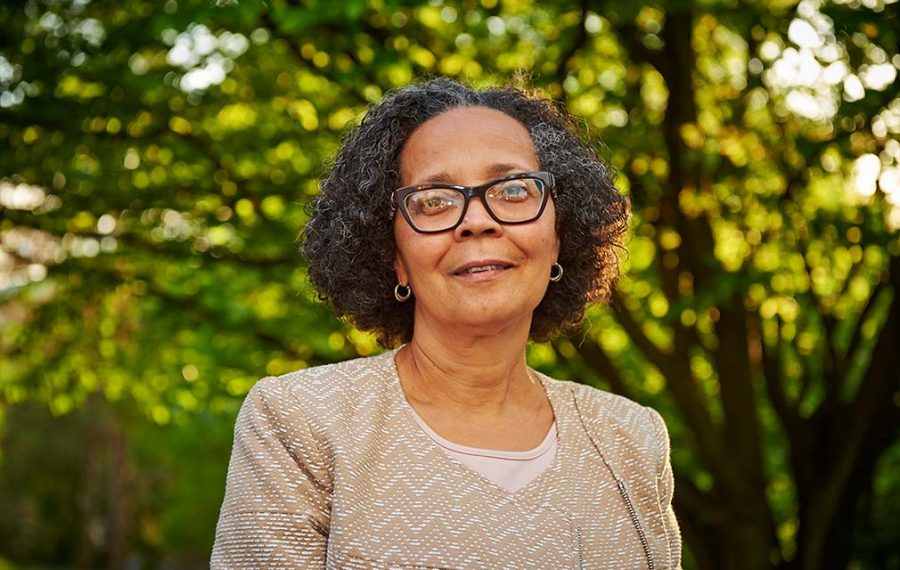Diane Ciccone: Present and Past Colgate Culture
As a member of the first class of women to graduate from Colgate in 1974, Diane Ciccone has been a committed member of the Colgate community since she was an undergraduate student. According to Ciccone, a co-founder of Alumni of Color who has served on Colgate’s Alumni Council and Board of Trustees, the Colgate community felt different during her time as a student.
“Academically, Colgate was as rigorous as it is now, but you were often in a classroom when you were one of maybe two women, and being a black woman I don’t think I was ever in a classroom where there was more than one of me,” Ciccone said.
Socially, Ciccone was able to foster bonds with those who held similar identities to her.
“The campus social life was either fraternity parties or men would go to other schools, so particularly that first year the only people who seemed to be on campus were people in our class. … So we formed very strong bonds amongst ourselves,” Ciccone said. “When they opened the Cultural Center we were able to have parties there, but it was different. … I went to a public high school and I think a lot of the students went to private school. I was first generation, and you did know that you were a small percentage of the campus because there were just so few of us.”
In addition to receiving her juris doctor degree from Hofstra University in 1977, Ciccone became a dedicated advocate for Colgate students following her undergraduate career. According to Ciccone, serving as a mentor for students of color in part motivates her engagement with the Colgate community.
“I would say that my Colgate experience was bittersweet,” Ciccone said. “I formed some really great friendships with students, but I never really had any attachments to faculty.”
There were no women faculty members during Ciccone’s undergraduate experience. During this time, too, academia was dominated by white males. Nonetheless, Ciccone had her sights set on law school.
“We used to have this statement that if you could survive Colgate, you could survive anything. … So, as a Black woman going into a white male profession [of law], I was ready to handle that because I’d gone to Colgate,” Ciccone said.
Despite Ciccone’s success in her law career, absent from this path were others with similar backgrounds and experiences as her.
“In the mid-1980s … [alumni] were thinking about forming Alumni of Color, and I went [to the meeting] and there were two Black women who were in their first year of law. They had graduated from Colgate and they felt like they knew no other Black women who had gone into law from Colgate, but in my class there were five of us,” Ciccone said. “That said to me that I needed to be present with students going forward so they understood that there were people who came before them that looked like them who managed to get through Colgate and go on to do different things.”
In thinking about the evolution of the Colgate community over the past 50 years, Ciccone acknowledged progress in terms of diversifying the undergraduate and faculty communities, but questioned which developments are attributable to Colgate’s work specifically.
“When I came to Colgate there were 132 women, so in terms of co-education Colgate has made strides,” Ciccone said. “I will say that it took a while before Colgate felt like a co-education institution. It’s one thing to have the numbers, it’s another to have people in positions that understand, and [can] change the culture.”
In addition to enrolling more women, Colgate has employed and admitted others with marginalized identities.
“There were no BIPOC faculty [50 years ago], so those numbers have grown as well. I think when you look at the LGBTQ+ population, which was something that nobody talked about while I was a student, the fact that we have different groups that just didn’t exist shows some sort of progress,” Ciccone said. “But is it really Colgate’s progress or is it that the culture has changed? And that students who are coming to Colgate are demanding and creating and carving things that will make them feel comfortable.”
In considering the work that needs to be done with regards to diversity, equity and inclusion (DEI) on campus, Ciccone notes that while progress has been made, our community still has much ground to cover.
“It’d be nice if we didn’t have to have the DEI conversation because it’s no longer an issue. Because we’ve evolved so much as a culture and a community that we don’t need to focus on it because it’s so natural … it’s a part of who we are. I don’t see that happening in the next five to 10 years as I’m 50 years out and we’re still talking about it, but that’s my optimistic self,” Ciccone said.




